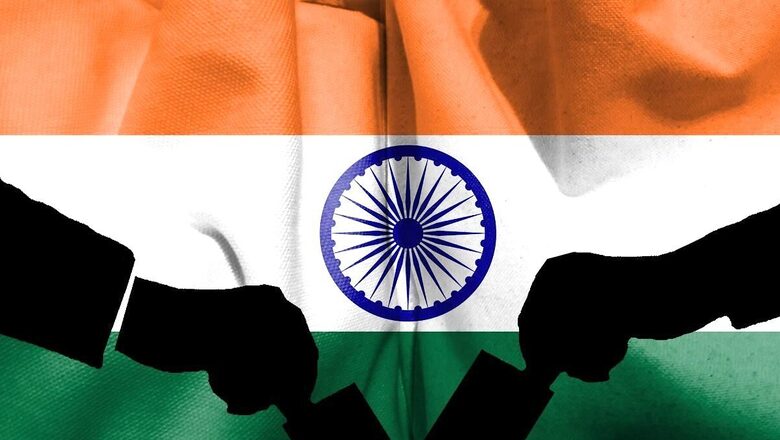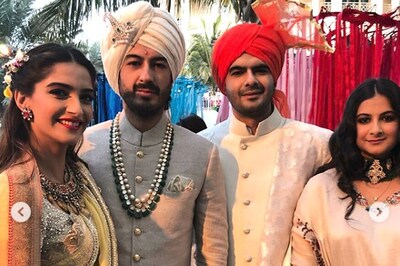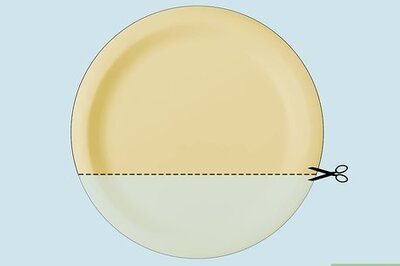
views
Lok Sabha elections in the Hindi heartland will be held from April 19 to June 1, with Uttar Pradesh and Bihar voting in seven phases, Madhya Pradesh in four phases, Chhattisgarh in three phases, and Jharkhand in four phases, the Election Commission announced in a press conference on Saturday. The results for the General Election 2024 will be announced on June 4 when votes are counted across India.
UP’s eight seats will vote in phase 1 on April 19, eight in phase 2 on April 26, 10 in phase 3 on May 7, 13 in phase 4 on May 13, 14 in phase 5 on May 20, 14 in phase 6 on May 25 and 13 in the last phase on June 1.
For Bihar, four seats will vote in phase 1 on April 19, five on April 26, five on May 7, five on May 13, five on May 20, eight on May 25, and eight on June 1.
In Madhya Pradesh, polls will be held in four phases. Six seats will vote on April 19, seven on April 26, eight on May 7, and eight on May 13.
Chhattisgarh’s one seat will vote on April 19, three on April 26, and seven on May 7. Meanwhile, Jharkhand will see polling in the latter half of the schedule, with four seats set to vote on May 13, three on May 20, four on May 25 and three on June 1.
The Prime Minister Narendra Modi-led BJP is looking for a historic third term in power, with the Opposition cobbling together the Indian National Developmental Inclusive Alliance (INDIA) to stop the saffron party’s victory run.
The politically crucial Uttar Pradesh sends 80 parliamentarians to the Lok Sabha and is often considered the make-or-break state for any party. Bihar has 40 seats, while Madhya Pradesh has 29. Meanwhile, Chhattisgarh and Jharkhand send 11 and 14 MPs respectively.
UTTAR PRADESH
UP’s significance can be understood from the fact that the state with the second-most seats, Maharashtra, has only 48 Lok Sabha seats. Uttar Pradesh has also given India the maximum number of prime ministers.
Proving all arithmetic of the SP-BSP ‘mahagathbandhan’ in Uttar Pradesh wrong, the BJP and its ally Apna Dal(S) won 64 of the 80 Lok Sabha seats in 2019 demolishing the alliance partners, which got 15 seats between them.
The Congress won the lone Raebareli seat of Sonia Gandhi in the politically crucial state.
Of the alliance partners, the Mayawati-led Bahujan Samaj Party (BSP) was the biggest gainer with 10 seats. Akhilesh Yadav’s Samajwadi Party (SP) won five seats and the smallest of the partners — Rashtriya Lok Dal — couldn’t open its account in the polls.
The Congress’s biggest loss was in its bastion Amethi where then party president Rahul Gandhi was defeated by union minister Smriti Irani, who had lost the seat in 2014.
Prime Minister Narendra Modi won from the Varanasi seat defeating his nearest rival Shalini Yadav of the SP by a margin of 4,79,505 votes, bettering his previous margin of 3,71,784 votes in 2014.
Akhilesh Yadav’s wife Dimple and his cousin Dharmendra lost in Kannauj and Badaun, respectively. His other cousin, Akshay, lost from Firozabad.
BIHAR
Bihar witnessed a political upheaval recently as chief minister Nitish Kumar’s Janata Dal United (JDU) got out of an alliance with Tejashwi Yadav-led Rashtriya Janata Dal (RJD) to form a government with the Bharatiya Janata Party (BJP). Six members of the Mahagathbandhan, too, switched to the BJP. The BJP has already allied with Jitan Ram Manjhi’s Hindustani Awam Morcha (HAM) for the polls.
Determined to give them a fight, Tejashwi Yadav started his ‘Jan Vishwas Rally’ in Patna on March 3, in which his father Lalu Prasad Yadav took a potshot at Prime Minister Narendra Modi for attacking “parivaarvaad” because he did not have a family of his own. This has led to the BJP’s ‘Modi Ka Parivar’ campaign on social media.
In the 2019 Lok Sabha elections, the National Democratic Alliance (NDA), comprising the BJP, JDU and the Lok Janshakti Party (LJP), had won 39 of the 40 seats. The Mahagathbandhan, comprising Indian National Congress (INC), Rashtriya Janata Dal (RJD) and Rashtriya Lok Samta Party (RLSP), had secured just one seat, Kishanganj, with Congress’s Md. Jawed as the winner.
MADHYA PRADESH
Fresh from assembly elections last year, the political scenario in Madhya Pradesh seems more or less settled ahead of the Lok Sabha polls. The BJP, which registered a landslide win in that election, beat anti-incumbency against chief minister Shivraj Singh Chouhan. And not much will change for the saffron party if the results of 2019 are also taken into account.
The political crisis of 2020 in the Hindi belt notwithstanding, the state’s past electoral trends show a tough contest between the two major parties – BJP and Congress. This time, the Congress is joined by the Samajwadi Party as part of the opposition INDIA bloc. The Congress, which had won the state elections in 2018 as the single largest party, ran into a political crisis as Jyotiraditya Scindia defected to the BJP along with 22 rebel MLAs.
But, the BJP swept the 2023 election as it reaffirmed its hold on the state, often known as the ‘Heart of India’. With frequent shifts when it comes to state polls, the BJP and Congress have been engaged in a constant tussle.
The BJP swept the state in the 2019 general election, winning 28 out of 29 seats, while the Congress managed to win only one. The saffron party had a vote share of 58% in 2019, while the Congress garnered a share of 34.5%. This makes the National Democratic Alliance (NDA) a frontrunner for this year’s polls as well, even as the Congress aims for a comeback.
For 2024, the BJP has fielded Union minister Jyotiraditya Scindia from Guna, state president and sitting MP VD Sharma from Khajuraho, former chief minister Shivraj Singh Chouhan from Vidisha among others. The party declared 24 candidates on March 2.
The Congress, meanwhile, announced 10 candidates for the state in its second list. While only two names were retained, eight new faces were fielded.
CHHATTISGARH
Chhattisgarh, which traverses a thin line between its “Hindi belt” and tribal identity, has given strong mandates to the BJP in the last two Lok Sabha elections. But, it is still a complicated state marred by Naxal violence.
Still smarting from its loss to the BJP in the assembly elections last year, the Congress has once again fielded its trusty former chief minister Bhupesh Baghel from Rajnandgaon that is considered a stronghold of the saffron party. The six-term MLA is set to return to the Lok Sabha race after a decade.
Ruled by the BJP, Chhattisgarh has a total of 11 Lok Sabha seats and 90 assembly segments. Much like the state it was carved out of, Chhattisgarh is also likely to witness a fierce contest between the BJP and Congress.
The results of the assembly election in Chhattisgarh were unexpected as many analysts predicted the return of Baghel-led Congress but the BJP came to power winning 54 out of 90 seats.
While the BJP wants to maintain its winning streak in the state, the Congress is gunning for an improvement at a national level. If the results of the last two state elections are compared, then it can be seen that the Congress still has a foothold in the state. In the 2018 assembly poll, the BJP won only 15 seats and, while the saffron party won the 2023 election, the Congress still managed to bag 35 seats (42.23% vote share).
JHARKHAND
Jharkhand will fight 14 seats out of the total 543 Lok Sabha constituencies in summer and 81 assembly seats in October-November. The ruling JMM-Congress alliance was embroiled in political chaos after the arrest and resignation of chief minister Hemant Soren in a money laundering case.
The state with the largest tribal population has five seats reserved for Scheduled Tribes and one is reserved under the Scheduled Caste category.
In 2019, the BJP-AJSU alliance in Jharkhand won 12 of the 14 Lok Sabha seats in the state, while the opposition JMM and the Congress secured one seat each.
The BJP and AJSU party fought the 2019 Lok Sabha elections in alliance for the first time. While the BJP won 11 seats, its ally AJSU won the lone Giridih seat, where its candidate and Jharkhand Water Resources Minister Chandraprakash Choudhary beat JMM’s Jagarnath Mahato by 2,48,347 votes.
Union minister and BJP candidate Jayant Sinha won by a massive margin of 4,78,209 votes to retain the Hazaribagh seat, defeating Congress’ Gopal Prasad Sahu.
The BJP had won 12 of the 14 seats, with a vote share of 40% in the 2014 Lok Sabha elections. Meanwhile, the JMM bagged just two seats while Congress drew a blank.




















Comments
0 comment